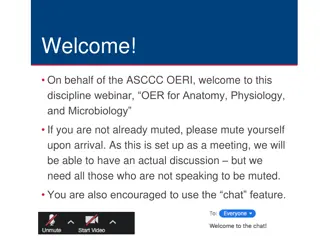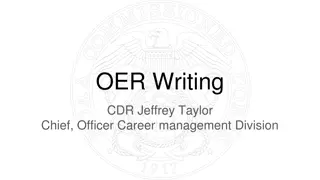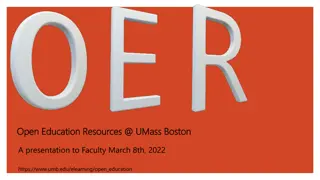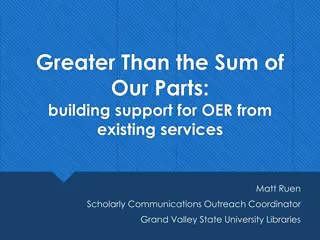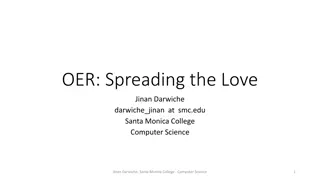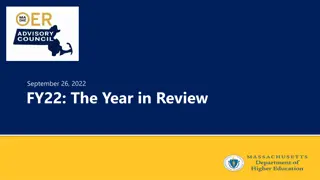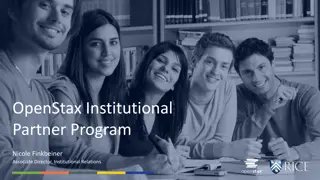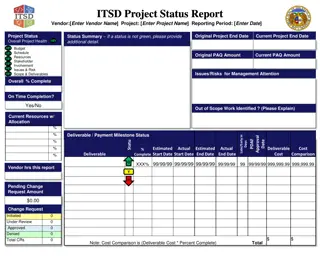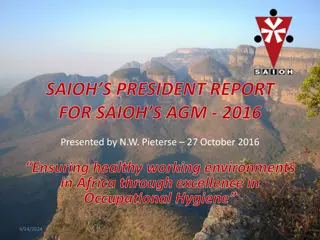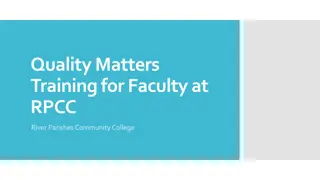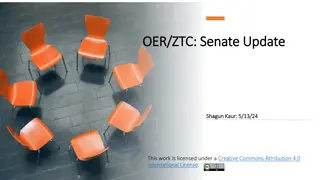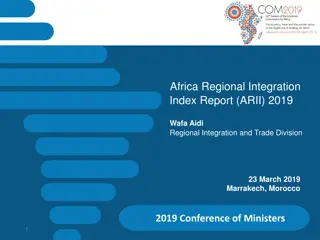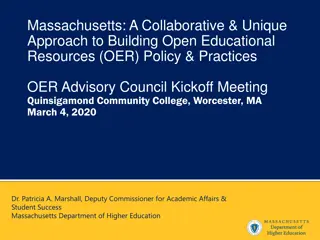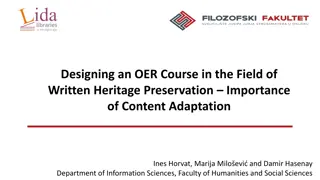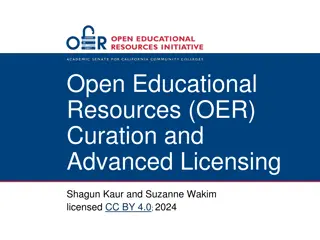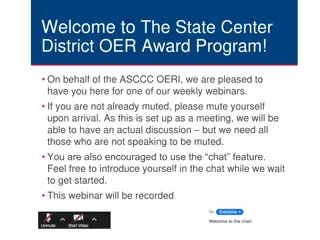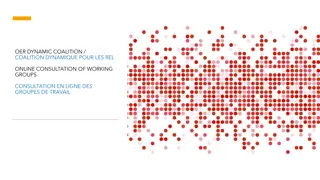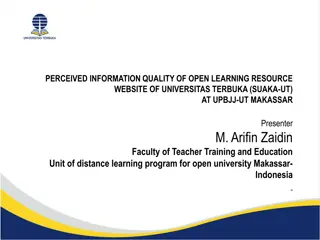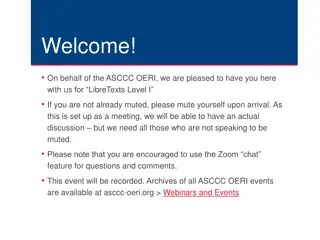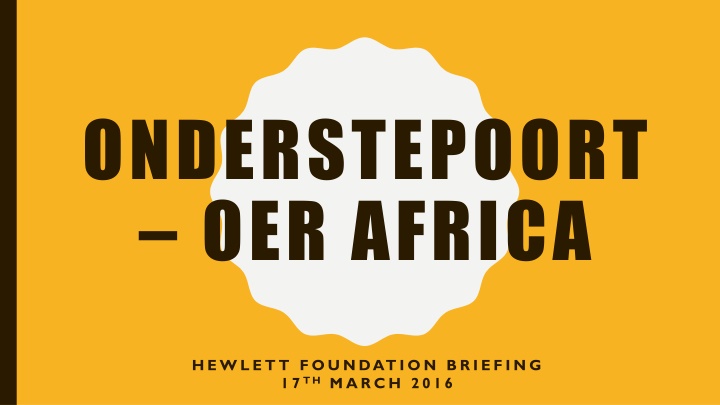
Empowering Veterinary Education Through Open Educational Resources
Explore the innovative project at Onderstepoort that leverages Open Educational Resources (OER) to transform teaching and learning in veterinary sciences. Follow the journey from project inception to Phase II, focusing on research, collaboration, and the integration of OER into academic programs across Africa.
Download Presentation

Please find below an Image/Link to download the presentation.
The content on the website is provided AS IS for your information and personal use only. It may not be sold, licensed, or shared on other websites without obtaining consent from the author. If you encounter any issues during the download, it is possible that the publisher has removed the file from their server.
You are allowed to download the files provided on this website for personal or commercial use, subject to the condition that they are used lawfully. All files are the property of their respective owners.
The content on the website is provided AS IS for your information and personal use only. It may not be sold, licensed, or shared on other websites without obtaining consent from the author.
E N D
Presentation Transcript
ONDERSTEPOORT OER AFRICA HEWLETT FOUNDATION BRIEFING 17T HMARCH 2016
AGENDA Project Overview Project Progress with some evidence PAR research considerations
ONDERSTEPOORT PROGRESS
PHASE I BACKGROUND Phase I: (2012-2014) OER Africa worked closely with Department of Veterinary Tropical Diseases to; Conceive an education model that embraced technology and openness Provide awareness of OER to staff within the wider faculty Construct AfriVIP, an online repository of quality veterinary teaching and learning resources, as an initial mechanism to achieve the vision of a blended open learning environment. By the end of phase I AfriVIP was launched (http://www.afrivip.org/) containing predominately CPD resources. Phase II commenced in 2015 and will run to early 2017.
PHASE II VISION An important focus of the grant is to research how OER might support transformation in teaching and learning. Using PAR to collect data to determine any influence Phase II was designed to leverage progress made in the phase I grant. Activities have been designed in three particular areas to elicit data for the research: 1. Expand the AfriVIP repository and enhance the CPD experience but also design ways to use the database for teaching both undergraduates and postgraduates. 2. Encourage faculty staff and students, beyond the Veterinary Tropical Diseases Department who were the focus of phase I, to adopt and contribute OER for the development of courses through advocacy and training. 3. Use AfriVIP to develop collaborative partners with other faculties of Veterinary Science across the African continent using the creation and sharing of OER. 4. From lessons learnt during phase II provide the VC with a suggested revision of the institutional IP policy.
PHASE II TARGETS 1. Continuing Professional Development (CPD) courses being offered by Onderstepoort will be developed using OER, with at least five new courses operational by the end of the grant. 2. The newly established AfriVIP Portal will be systematically integrated into the delivery of at least four different undergraduate and postgraduate programmes at the Faculty, as a primary source of educational materials for these programs 3. A revised institutional policy on intellectual property will have been developed under the auspices of the Information Governance Committee, based on the lessons learned from the work at Onderstepoort 4. Planning engagements with at least one other Faculty at the University of Pretoria will have been concluded, with commitment from that Faculty for integration of OER into its educational activities 5. At least two other Faculties of Veterinary Sciences from Southern and/or Eastern Africa will be actively contributing resources to the development of the AfriVIP Portal. 6. A detailed collaborative project will have been successfully designed, incorporating at least 4-5 of the Faculties of Veterinary Science participating in the Regional Deans meeting
PHASE II STRATEGY & PROGRESS Specific Activities Progress Complete: Meets four times a year to coordinate OER initiatives Create a Faculty OER Management Team to co-ordinate initiatives. Stalled due to change in management Create a steering committee to provide an enhanced vision In process: OER Africa developing functional specs for improved AfriVIP experience. New resources being added monthly. Expand AfriVIP functionality -Automate the allocation of CPD points & provide users with a CPD portfolio that creates a SAVC CPD report. On going: Currently activities coordinated by OER Management Team and by the Block builders initiative. Advocate OER to staff and student and elicit contributions for AfriVIP Complete: Content being negotiated with potential collaborators. Using draft proposal. With deans from regional faculties conceive a collaborative OER project. Held over to later phase of the grant Prepare a draft OER policy/strategy document at conclusion of Phase II to inform UP management on how to adjust IP policy statements.
PHASE II STRATEGY & PROGRESS Activity Progress Complete: OER Africa in consultation with OP devised a draft document. Develop PAR research agenda to determine how the Block Teaching method, use of technology and OER are impacting teaching & learning Partly complete: Research is being coordinated by Education Innovation unit. Faculty members are still being identified and approached. Nominate a PAR research team. In process: First round of training, Block Builders Workshop complete. Now refining the programme to accommodate more educators. Use the requirement to move to block teaching to encourage blended learning and use of OER in numerous 2ndYear subjects. Not yet commenced Collect data and report on 1stround of findings. See slides 12 discussion of the research
PHASE II STRATEGY & PROGRESS - REGIONAL DEANS PROJECT The intention is to use AfriVIP as a central repository for OER generated by different institutions, each with their own user web interface but sharing the same backend resources. All four of the institutions consulted said they would use official student assignments to generate the OER teaching resources to share.
STRATEGY & PROGRESS - EVIDENCE Some examples of the new OER being offered by staff and students. On AfriVIP see a selection of audio visual resources, Horse handling videos and theatre procedure videos: http://www.afrivip.org/education/audiovisualteaching http://www.afrivip.org/education/audiovisualteaching/videos/horse-handling/2014 http://www.afrivip.org/education/audiovisualteaching/videos/theatreprocs/2015 On UP Space see slide collections (This one is Ecosystems and Ecology) http://repository.up.ac.za/handle/2263/33086 On YouTube see AfriVIP channel of streamed resources https://www.youtube.com/user/vethub On EduWiki see Prof Kriek s contribution on Wildlife diseases http://awp.eduwikis.co.za/index.php?title=African_Wildlife_Diseases
PARTICIPATORY ACTION RESEARCH TO ASCERTAIN THE EFFECTIVENESS OF THE BLOCK SYSTEM
RESEARCH BACKGROUND Supposed Benefits During 2015, after consultation with staff, it was decided that the 2nd year Vet. Sci. course would be taught in continuous, subject dedicated, blocks rather than teaching departmental topics in parallel. In addition it was hoped that when revising topics departments would exploit technology, use inquiry-led methodologies and use Open Educational Resources. The research is to ascertain what impact, either positive or negative, do these these new dimensions bring to the quality of learning. Exclusive focus on topic Time for students to master knowledge and skills Forces different teaching methods to break monotony of lectures Block Teaching Allows for anytime/anywhere access to learning resources and activities Encourages alternatives to text-based resources Allows for diagnostics of student progress as captured in LMS Technology Access to existing free, quality learning resources Exposes developers to other teaching approaches Opportunity to showcase staff and student generated resources beyond the university. OER
What effect does the teaching system have on the long-term performance of students in the Bachelor of Veterinary Sciences programme? PRIMARY RESEARCH QUESTION PAR OP OER Africa Research Agenda
SECONDARY RESEARCH QUESTIONS 1. What effect does the block teaching system have on short-term results? Is performance better or worse than previous years? What effect does the block teaching system have on subsequent results beyond second year? Is performance better or worse than previous years? How do teaching and learning methods and educational approaches change as a consequence of the introduction of block teaching? Does the block teaching system lead to a sustained increase in the use of educational resources and teaching aids? Why? To what extent are lecturers harnessing OER as part of this increased resource use? 2. 3. 4.
SECONDARY RESEARCH QUESTIONS 5. How do assessment practices change with the introduction of the block teaching system? What are the consequences negative and positive of this ? What effect does the block teaching system have on lecturers? Does it demand more or less of their time? Does it lead to improved or diminished research output? If more, why is this? And is this only in the short term due to introduction of the block teaching system or is it likely to be ongoing? If less, where are the savings? And what are lecturers doing with the time saved? What impact does the block teaching system have on programme management and administration? Do these associated overhead costs increase or decrease? 6. 7.
SECONDARY RESEARCH QUESTIONS 8. How are students lives affected by the block teaching system? Is it leading to any diminution in their social/campus life as students ? What are the unintended consequences of implementation of the block teaching system? 10.Would this be + or for the lecturer or the student or does it only refer to student performance? If only performance of students, will it only be the assessment practice in the block system that will determine whether it is positive or negative? 11.Would it be possible to determine this it is the first year that the students come to OP (remember they do the 1st year at the Hatfield campus) What would it be measured against? 9.
RESEARCH TEAM Education Innovation Unit: El-Marie Mostert and Marius Pienaar Faculty of Veterinary Science: Dietmar Holm (Acting Deputy Dean) & others OER Africa: Neil Butcher & Andrew Moore
RECENT DEVELOPMENTS 1. At the end of 2015 Linda van Ryneveld, Deputy Dean (Academics) and OP s liaison person for this project, resigned and moved across to the Faculty of Education. Dietmar Holm is in the process of being appointed as Acting Deputy Dean and has taken up the many of Linda s duties, including coordinating our project. The Dean, Darrell Abernathy, remains fully committed to our project, and has special interest in the results of the PAR. Activities in the early part of 2016 focused on; 1. Ensuring we still had the support of management for the project 2. Preparing the Block Builders Workshop to capacitate staff in pedagogy, technology and OER. 3. Fine tuning the PAR agenda and locating research champions. 2. 3. 4.
RECENT DEVELOPMENTS The movement of Linda van Ryneveld from Veterinary Science to Education does afford OER Africa a fortuitous opportunity to expand awareness of OER and also provide an additional campus to collect data for the PAR. Linda is an advocate of using OER and she notes the Education Faculty is already constructing a course using OER. Linda has expressed interest in using OER Africa support to drive these types of initiatives within the faculty.
THANK YOU HEWLETT FOUNDATION BRIEFING

